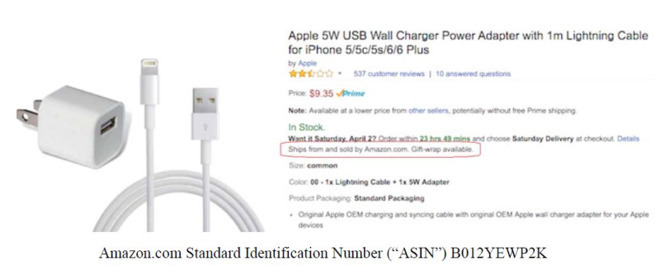Not long after related Apple efforts, Amazon is about to embark on eliminating counterfeit vendors from its online store — making it a major focus for 2017, a report said on Monday.
Teams in U.S. and Europe are working with major brands to set up a registry of recognized sellers, even if they aren't already on Amazon, according to a Bloomberg source. Allegedly the company began testing the registry earlier this year, signing up brands like Nike, and 2017 will simply see it expand to encompass thousands of firms, assuming outreach efforts are successful.
Merchants wanting to sell brands linked with the registry will have to show proof they're authorized to do so. While this may make it harder for independent sellers to get started — especially after Amazon imposed high fees on resellers for some brands earlier this year — it could deal a blow to counterfeit manufacturers operating out of countries like China, which will often produce poor-quality knockoffs with names and product descriptions designed to confuse shoppers. Some legitimate businesses have reportedly been reluctant to sell on Amazon because of the problem.
Apple in particular has been a common target for counterfeiters, given the popularity of its products and the sometimes high cost of its authorized accessories. In October the company launched a lawsuit against a vendor called Mobile Star, which has been selling fake power cables and adapters, though it has long been pushed off of Amazon.
At the time Apple made the claim that nearly 90 percent of Apple accessories sold as genuine through the "Fulfillment by Amazon" program were fake.
 Roger Fingas
Roger Fingas








 Charles Martin
Charles Martin

 Malcolm Owen
Malcolm Owen
 William Gallagher
William Gallagher

 Christine McKee
Christine McKee
 Wesley Hilliard
Wesley Hilliard









14 Comments
Can they start with every single Apple Watch Band seller that is using Apple's photography to pass off their cheap imitations.
I'm actually surprised Amazon is doing this. They make a ton of money off counterfeit goods from China.
Also check for broken electronics resale without proper FCC codes. There is plenty of Chenese companies that sell blown electronics (exploded capacitors or other elements) for cheap as parts from some disassembled devices. They require FCC numbers by federal regulations, but they do not carry one. If it is not automotive electronics then it cannot be solde in the USA. That also creates gap where legal manufacturers have to go through painful and not cheap FCC process and then it sounds like promotion to China to sell cheap and conquer the market without proper certification process for electronics.